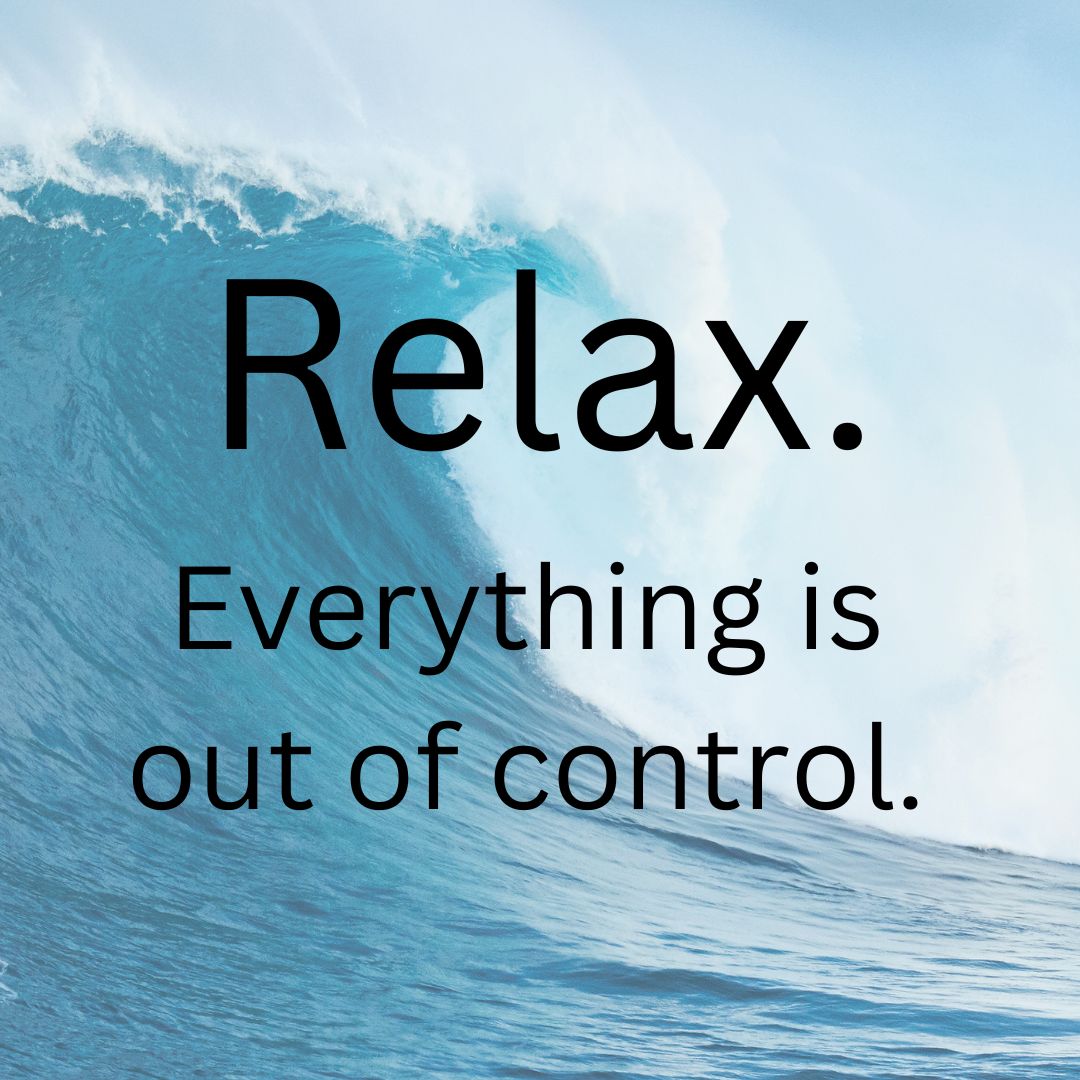I’ve been thinking a lot about control lately. The human desire for control is the product of a mind (and body and nervous system) that is uncomfortable with the unknown. Based on everything that has happened to you up until this moment, your brain has created your reality – what you know to be good, right and true, and what you know to be bad, false, wrong – and hardwired that reality into your nervous system.
When a conversation or experience challenges that reality, your brain has to spend more energy rewiring and integrating this new information. Energy conservation is a priority of your nervous system, so it will try to avoid situations where rewiring might be necessary – new jobs, new relationships, uncomfortable conversations, new physical limitations, new living situations… (anything new, really!)
Whether we perceive change as positive or negative, it threatens the status quo, and we often respond by reaching for certainty. Control.

How do you reach for certainty when you’re feeling anxious, worried, angry, sad, nervous, ambivalent, overwhelmed, lost, afraid, frustrated, annoyed…?
Do you tend to micromanage situations or people?
Do you spend time with people who you know will share your opinions?
Do you cast about for projects or situations that you know you can control?
Do you make choices that limit the possibility of coming in contact with new people, information or ways of thinking?
I don’t like to admit it, but I have extensive firsthand experience with each of those reactions. In my experience, they don’t really work – reaching for control leaves me feeling rigid and stuck, unable to become more comfortable in situations where I’m not in control.
Whether we like it or not, life is full of variables and unknowns – and that’s what makes it interesting and worth living. Without change, there would be no growth; everything would stay the same. So, what do you do with that paradox of your desire for change and the nervous system’s resistance to it?
– Getting more comfortable with being uncomfortable is a good start. Pause, even if just for a few breaths to feel your emotions, not just in your head but in your body. What sensations do you feel when you’re frustrated? When you’re sad? When you’re nervous?
– Welcome those sensations, because that’s the start to a new conversation between you and your body.
– Let go of judging – sensations and emotions aren’t good or bad, right or wrong – get curious about what old stories, patterns and expectations are present.
– Repeat. The more you practice, the more skillful you’ll become. You can’t always choose what happens, but you can choose how you think about it, and how you want to respond.
Simple? Yes. Easy? No.
But give it a try. Think of a recent situation in which you felt out of control and go through those steps. Let me know what happens for you.
Working with the nervous system and the mind-body connection is an integral part of my approach to teaching movement, and my students recognize its value in their bodies and in the rest of their lives.
In my online classes you will learn how to listen to your body, how to check in with your nervous system, and how to cultivate more stability, mobility and ease.
If greeting the day with more energy and fewer aches and pains sounds good to you, join this session of Mindful Movement classes. More details here.
Looking for your next inspiring read?
One of my daily rituals is to sit with my morning coffee and a chapter or two of a good book before I look at a screen. I try to choose a book that will help set the tone for the day, and Oliver Burkeman’s latest book, “Meditations for Mortals” was a perfect choice. His “This column will change your life” was a regular feature in The Guardian from 2006-2020; throughout his years of writing about self-help, psychology and productivity, he has gained a broader perspective than most of us on what makes us tick. He also writes a bi-monthly newsletter, “The Imperfectionist” (isn’t that a great title?!).
This book appealed to me because of both the format and the subtitle, “Four Weeks to Embrace Your Limitations and Make Time for What Counts.” Burkeman envisions the book as a mini retreat, inviting us to read one short chapter per day for 28 days. Instead of making promises about how much more productive and successful we will become at the end of the four weeks, Burkeman reminds us that we will never have it all figured out, that being a mortal human means there will always be new problems to solve, ongoing challenges to face, and a never-ending to-do list. He goes on to explain that acknowledging this reality frees us from the ways we often struggle against it, and from that place we can consider what actions might create a more meaningful life.
Each week is arranged around a theme, and the reader is invited to hold the day’s reading lightly, trusting that they will receive what they need from that chapter, and in the cumulative effects of reading one short chapter per day. From my work in movement, and through my experiences in the rest of life, I recognize the rigidity and disfunction that is perpetuated by the need to “get it right”, and I love that this book doesn’t ask me to do more of that.
Burkeman’s approach resonates on a deep level as I continue to learn to embrace my imperfections as part of my wholeness. If this strikes a chord, I encourage you to order a copy from your library or local bookstore!
Learn more about Oliver Burkeman and sign up for his newsletter here: https://www.oliverburkeman.com/
Here’s his last Guardian column: https://www.theguardian.com/lifeandstyle/2020/sep/04/oliver-burkemans-last-column-the-eight-secrets-to-a-fairly-fulfilled-life
Interested in more? Here’s a TEDx talk in which Oliver Burkeman speaks about patience as a superpower: https://youtu.be/42cwiP25ChI?si=KciC0_hLFLAcTHv2



